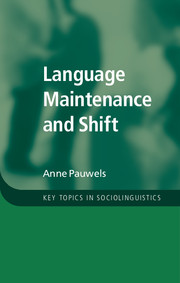Book contents
- Frontmatter
- Dedication
- Contents
- Acknowledgements
- Introduction
- PART I HISTORY, CONCEPTS, CONTEXTS AND APPROACHES
- PART II INVESTIGATING LANGUAGE MAINTENANCE AND SHIFT: COLLECTING AND ANALYSING DATA
- PART III IDENTIFYING AND UNDERSTANDING TRENDS AND PATTERNS IN THE DYNAMICS OF LANGUAGE MAINTENANCE AND SHIFT
- PART IV LANGUAGE MAINTENANCE EFFORTS AND REVERSING LANGUAGE SHIFT
- 8 Efforts, agencies and institutions for language maintenance
- 9 Reversing language shift
- PART V FUTURE DEVELOPMENTS IN THE STUDY OF LANGUAGE MAINTENANCE AND SHIFT
- References
- Index
- References
9 - Reversing language shift
from PART IV - LANGUAGE MAINTENANCE EFFORTS AND REVERSING LANGUAGE SHIFT
Published online by Cambridge University Press: 05 August 2016
- Frontmatter
- Dedication
- Contents
- Acknowledgements
- Introduction
- PART I HISTORY, CONCEPTS, CONTEXTS AND APPROACHES
- PART II INVESTIGATING LANGUAGE MAINTENANCE AND SHIFT: COLLECTING AND ANALYSING DATA
- PART III IDENTIFYING AND UNDERSTANDING TRENDS AND PATTERNS IN THE DYNAMICS OF LANGUAGE MAINTENANCE AND SHIFT
- PART IV LANGUAGE MAINTENANCE EFFORTS AND REVERSING LANGUAGE SHIFT
- 8 Efforts, agencies and institutions for language maintenance
- 9 Reversing language shift
- PART V FUTURE DEVELOPMENTS IN THE STUDY OF LANGUAGE MAINTENANCE AND SHIFT
- References
- Index
- References
Summary
In this chapter we address two questions relating to LS: (1) Can LS be reversed? (2) Should LS be reversed? The first question very much builds upon the previous chapter in which we discussed at length the diverse efforts that families and communities are known to undertake to keep their language(s) going. To what extent such efforts have been successful in reversing LS is a question to which there has been no clear response to date. There is no doubt that some of the efforts and initiatives discussed in Chapter 8 have been of assistance in slowing down the rate of LS or in keeping the minority or heritage language alive in select domains or for special functions. Furthermore, in Chapters 6 and 7 we identified a range of individual and group factors and forces that could provide a positive disposition to LM and thus slow down LS. Yet the general consensus amongst LM researchers working in migrant settings is one that sees LS as the inevitable result of such language contact. Furthermore, its process is often completed within three generations, especially in communities with limited recourse to LM institutions. These observations and findings can also be said to apply to many territorial minority settings, especially when they are a minority without status, legally enshrined or not. Given the view of the inevitability of LS, at least for migrant communities, the task of reversing LS is particularly challenging. In the next section we will discuss the Graded Intergenerational Disruption Scale (GIDS) that has been developed by Joshua Fishman (1990) as an aid in diagnosing the state of a language, i.e., in ascertaining the degree of threat to or vitality of a language. The scale also includes the steps or stages the affected speech community needs to go to through to revitalise its language and, thus, reverse LS, which in some cases may imply bringing it back from near extinction. In the second part of this chapter we tackle briefly the question that often evokes strong feelings and reactions not only in the affected communities but also among the scholarly community, i.e., Should LS be reversed?
CAN LS BE REVERSED? THE GRADED INTERGENERATIONAL DISRUPTION SCALE
In 1990 Joshua Fishman (Fishman 1990) published a paper entitled ‘What is reversing language shift (RLS) and how can it succeed?’
- Type
- Chapter
- Information
- Language Maintenance and Shift , pp. 154 - 164Publisher: Cambridge University PressPrint publication year: 2016



